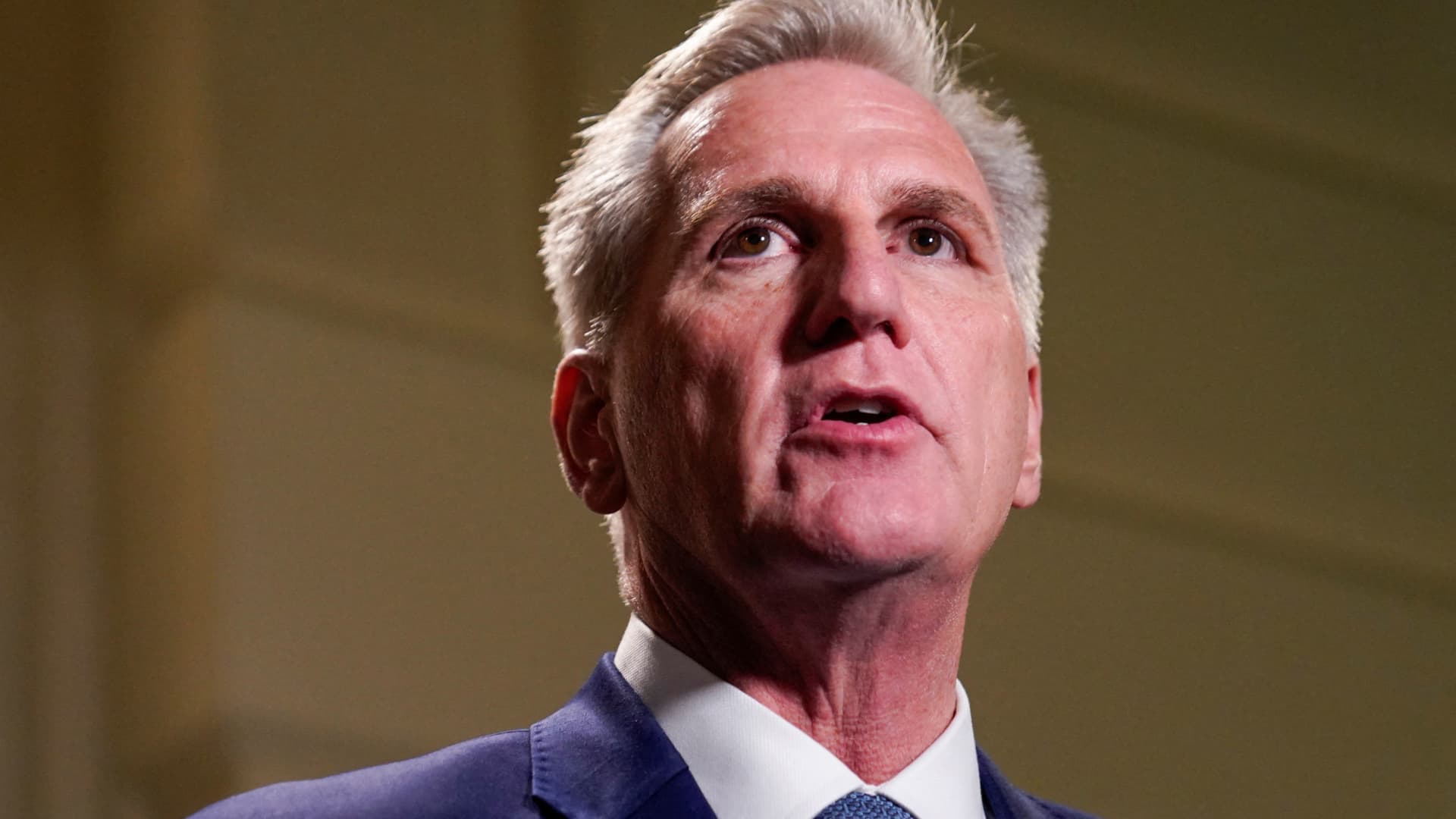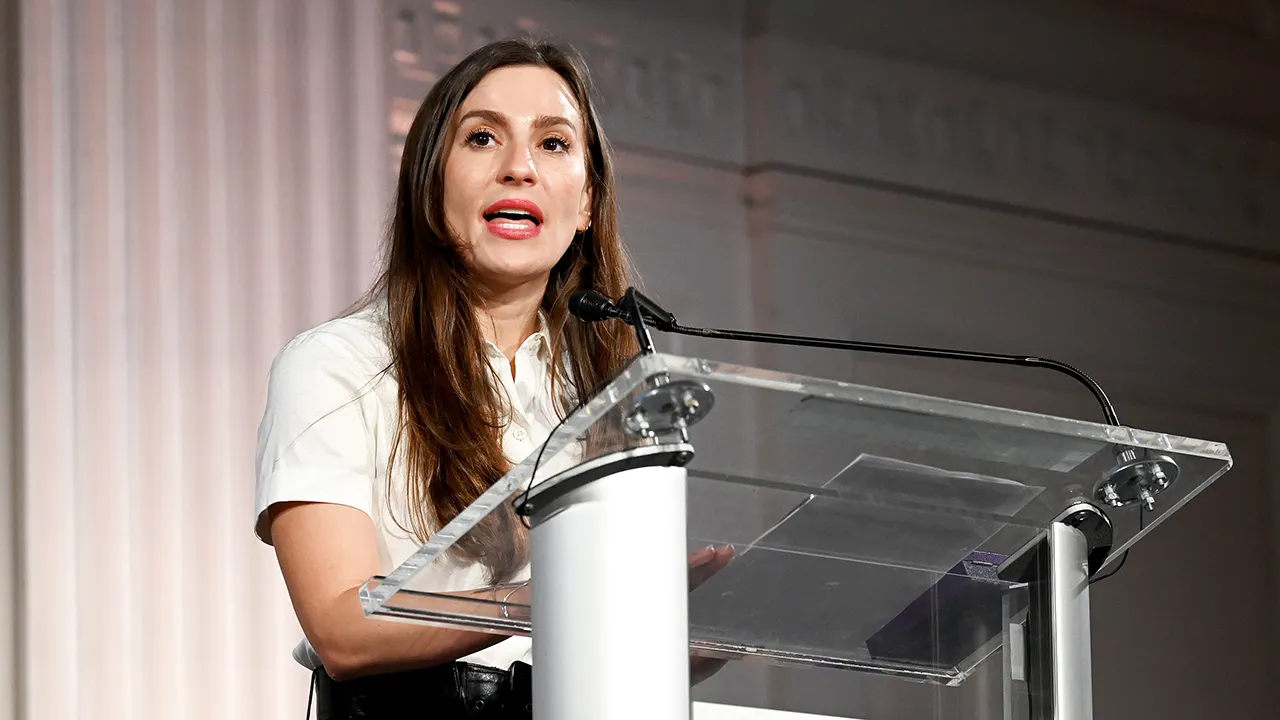U.S. Rep. and former House Speaker Kevin McCarthy (R-CA) speaks to the news media after it was reported that U.S. Rep. Jim Jordan (R-OH) would not seek a third vote to become the next Speaker of the House and instead will back a plan to empower Speaker of the House Pro Tempore Patrick McHenry (R-NC) to hold the post until January, at the U.S. Capitol in Washington, October 19, 2023.
Elizabeth Frantz | Reuters
The saga of electing a speaker of the House is back at square one.
House Republicans entered the weekend without their leading speaker candidate, Rep. Jim Jordan, R-Ohio, who dropped out of the race on Friday. An internal vote among Republicans found that a majority wanted to pursue a new nominee.
“This is embarrassing for the Republican Party, embarrassing for the nation,” former speaker Kevin McCarthy, R-Ca., said Sunday on NBC’s “Meet the Press.” McCarthy was ousted from his post on Oct. 3 after Republican disagreement on the budget nearly caused a government shutdown.
After Jordan bowed out on Friday, a flurry of Republican candidates announced they would consider entering the race, including Majority Whip Tom Emmer, who appears to be a frontrunner. As of Sunday, nine Republican representatives have committed to campaigning for speaker.
Here is the list of the Republican candidates:
- Rep. Tom Emmer, Minnesota
- Rep. Kevin Hern, Oklahoma
- Rep. Jack Bergman, Michigan
- Rep. Gary Palmer, Alabama
- Rep. Mike Johnson, Louisiana
- Rep. Byron Donalds, Florida
- Rep. Pete Sessions, Texas
- Rep. Austin Scott, Georgia
- Rep. Dan Meuser, Pennsylvania
McCarthy nominated Emmer on Friday, claiming that his ability to pass difficult bills and win majorities makes him “the best person for the job.”
Many Republicans have not been as bullish on any particular speaker nominee so far.
Rep. Michael Turner, R-Ohio, and Rep. Michael McCaul, R-Tx., both said Sunday they do not yet know who they will vote for, but said that they want to get this election done so they can continue to govern.
“Congress is a lot like high school but even more so, so hopefully we’ll get past this,” Turner said on CNN’s “State of the Union” on Sunday. He added that he has been and will continue to be a part of the governing majority so the party can agree on a speaker.
Former Republican Rep. Liz Cheney did not voice support for any specific candidate, saying on CNN’s “State of the Union” that the current state of House Republican dysfunction is not surprising.
Former House Speaker Newt Gingrich, who served from 1995 to 1999, said the House Republicans are dragging their feet.
“They should go into a conference, not come out, bring food in and stay there,” Gingrich said on “Fox News Sunday.” “They shouldn’t bring anybody out until they have 217.”
He added that the speaker nominee needs to be able to maintain those 217 votes for the next five to six months so that Congress is not in the same situation a couple of weeks from now.
Gingrich also said that he wishes there were women in the running like Rep. Elise Stefanik, R-N.Y., and Rep. Beth Van Duyne, R-Tx., who could be “more effective” in unifying the House. Of the nine candidates in the speaker race so far, none are women.
McCaul, who chairs the House Committee on Foreign Affairs, said that the speaker race deadlock is coming at a particularly inopportune moment, given world events such as the advent of the Israel-Hamas war and the ongoing war in Ukraine.
Without a speaker, the House has hampered its ability to provide funds for Israeli aid or issue a condemnation of the militant group Hamas, McCaul said Sunday on ABC’s “This Week.”
“The world’s on fire,” he said. “This is so dangerous what we’re doing and most importantly, it’s embarrassing, because it empowers and emboldens our adversaries.”
Republicans will reconvene to discuss potential speaker candidates on Monday at 6:30 p.m. ET. Tuesday morning at 9 a.m., they will gather for a Republican conference vote and aim to hold a floor vote later that day, according to interim Speaker Patrick McHenry, R-N.C.




















Discussion about this post